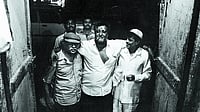If Tirunelveli is known for its halwa, the Thamirabarani river and uncrowded temples, its twin-town Palayamkottai is the place to which connoisseurs and folk studies researchers flock. Since 1987, the centre has been single-mindedly retrieving, preserving and providing recognition to the rich oral traditions of Tamil Nadu. FRRC has ensured that parayattam, thevarattam, therukkothu, karagattam, oyilattam, and numerous such folk forms are documented for posterity.
The director of the centre—affiliated to the Jesuit-run St Xavier’s College—Father Francis Jayapathy, elaborates on the need for such an effort: "The concept of Indian culture has been defined by Max Mueller, Max Weber and Kapila Vatsyayan. This draws from the tradition of Vedas, Upanishads and Puranas. But only three per cent of the population can read this. And another 40 per cent can listen to this being read. What about the cultural traditions of the remaining 57 per cent?"
Jayapathy, who considers his being a Christian accidental and his priesthood incidental, is a spirited man. "FRRC documents and archives the history of the vast majority whose culture is ignored for being non-classical. Our centre provides a platform for those whose culture is primarily oral." That a private college is doing what ideally must be the government’s job is just one part of the story. What is worse is that the centre has received support from a faraway funder like the Ford Foundation, but the state thinks its responsibility is over with the granting of university affiliation. The Ford money dried up after nine years and FRRC is today maintaining itself with interest from the final endowment. Mere maintenance of the institute and salaries for a staff of 12 comes to Rs 70,000 per month.
But what the centre has massed up over 13 years is phenomenal. Says Peter M.A. Raj, archivist at FRRC: "We have 3,500 hours of audio material—of rituals, festivals, local temple histories; there’s 700 hours of video footage of rituals and full-length, all-night performances—all shot in their natural contexts; 7,000 photographs and 900 slides. We’ve also been collecting palm leaf manuscripts. We have concentrated on southern Tamil Nadu but we have documented some folk forms of Kerala too." All these can be accessed for a daily reference fee of Rs 10 and membership fee of Rs 50.
Says Fr Vincent Britto, who heads the folk arts department at FRRC: "Our documentation efforts are in sync with the contextual, natural existence of a given art form. For instance, Kaniyans, an adivasi community found only in Tirunelveli, have been ritually performing Kaniyan Kootthu. Only recently have we been able to make them perceive it as an art form. They have a peculiar drum called Magudam which has a unique sound. For the first time we have captured it in an audio album Mannin Mettukal (Songs of the Earth)."
But these painstaking efforts might simply be lost to fungus and static since the material has been captured only on magnetic tapes. "We rewind and forward all the tapes every six months, so that they don’t get stuck. We want to digitalise everything but even the lowest estimate for such a project costs Rs 20 lakh," says Raj. At the moment, that is unthinkable.
Besides archiving, FRRC also undertakes education and research: starting from a diploma or a certificate course, it offers an MA and PhD in folk arts. "We have produced three doctorates till date. The MA programme is confined to 10 students per year but the certificate courses in the four districts of Sivaganga, Nagercoil, Madurai and Tirunelveli attracts some 500 students," says Jayapathy. On the publications front, FRRC brings out a newsletter in Tamil, Gramiyakkalai, and a bi-annual research journal called South Indian Folklorist. It has also published 12 books, including the Collected Works of Iyothee Thaasar, an early 20th century Tamil Buddhist thinker.
Today FRRC has visibly slowed down. A centre that set out to save and preserve folk arts is itself in need of some life support system. To revitalise it, contact: Folklore Resources and Research Centre, St Xavier’s College, Palayamkottai, Tamil Nadu—627002; Phone: 0462-574453, 574804; e-mail: FRRC@sancharnet.in
























